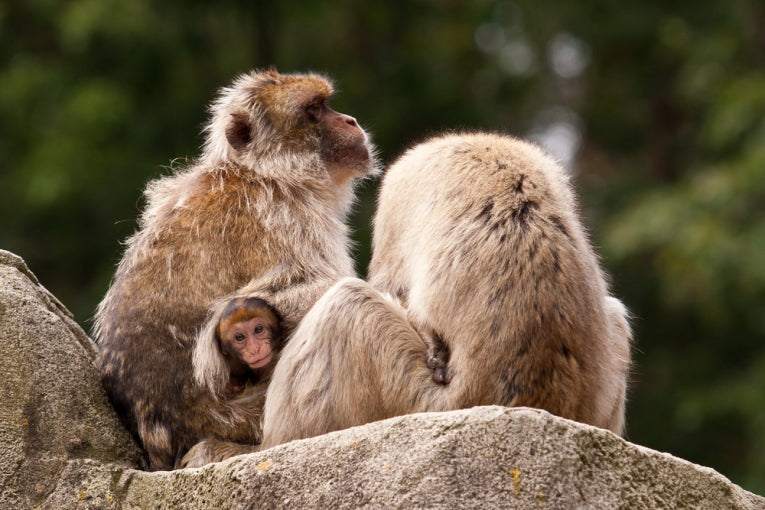The Barbary macaque was thought to be an ape years ago, when the lack of a tail seemed to place the species closer to the higher primates than other monkeys. One cold and snowy Atlas Mountain winter, 30 monkeys died in the two populations that live there. 2008/2009 was a very hard winter for 5 months, given up to 90cm (3 feet) of snow at Morocco's higher points. These are mainly herbivorous animals, with snow hiding their food supply and any insects, fledglings or small mammals unavailable in the cold, so this study was valuable in attempting to locate, first-hand, the factors that caused so many deaths. Starvation was assumed to be the cause of death.
Females of Macaca sylvanus are smaller than males and apart from this size factor, ranking and social bonding would also influence survival when individuals huddle together for thermoregulation. The correlations that were found in this opportune study were with the time spent feeding and number of social relationships. Luckily, from August 2008 to January 2009, scientists were in the area occupied with the Barbary Macaque Project (of the University of Lincoln), so the data for study was being collected as this situation developed. It was all collected for six months before this monkey tragedy.
Most primates have greater infant survival when there are strong and stable social relationships present. Such lucky individuals also live longer and have more offspring. Other non-primate species such as dolphins, marmots and horses have rather obvious similar relationship benefits.
For successful survival the researchers would expect to see the following.
More time would be spent feeding and building up fat reserves. More and higher quality social relationships would allow feeding tolerance and more useful huddling in the cold. Gender and rank were thought to count, as females require less energy to maintain their smaller mass and high ranking individuals have preference for food. What actually happened as the winter did its worst was remarkable. The 30 deaths represent 64% of the population at that time. The 17 survivors either stayed at their location or removed to a neighbouring group. These survivors benefited from longer feeding times and number of social relationships as predicted.
his means that quantity and not quality of social relationship was important for this emergency. Certain behaviour such as efficient (and non-aggressive) foraging obviously kept the monkeys alive, as did the number of individuals in a huddle. For the huddling behaviour, studies on Japanese macaques were usefully similar to their Barbary relatives. This research had no data on how long individuals spent together at night. Rank and gender had no effect on survival, according to this research, which will surprise some primatologists. As it is, this useful piece of field biology adds much more to the more laboratory scale research you often see. Richard McFarland and Bonaventura Majolo of the Universities of Lincoln and the Witwatersrand, respectively, publish today.
Perhaps climate change will affect many non-migratory species such as these mountain-dwellers. In the spring, plentiful feeding must gladden their hearts in the High Atlas, but if winters prove to be colder, these losses couldn't be tolerated for any seasons. Natural selection will prove a poor ally to conservationists if a species cannot adapt its repertoire to extremes any further than it already has. The paper, Coping with the cold: Predictors of survival in wild Barbary macaques, is published in Biology Letters of the Royal Society.










